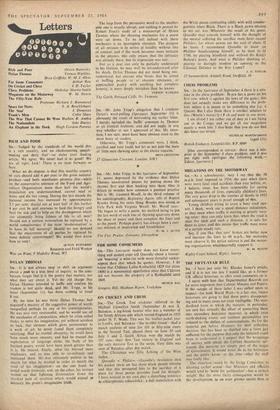DYLAN THOMAS
is not always easy to shift an argument about a poet to a true level of inquiry, as the com- batants forget that it is the poetry that matters, not
• what they say about it. Yet the old charge that Dylan Thomas intended to baffle and confuse his readers is not quite dead, and Mr. Tripp, in his letter (September 11), has done nothing to tread it out.
By the time he was thirty Dylan Thomas had acquired' a mastery of the suggestive power of words unequalled perhaps by any of his contemporaries. He was also very resourceful, and he would use all the mechanics of composition, which he often called tricks, to serve his imagination; yet without accident or luck, that element which gives permanence to a work of .art, he never found them completely satisfying. Had he trusted obscurity, he could have been much more obscure, and had he trusted the exploitation of language alone, the body of his finished poetry would have been much greater than it is. He trusted, finally, what lay beyond mere mechanics, and so was able to co-ordinate and transcend them. He was extremely patient in his search for what he wanted in order to match the need of his imagination: on the one hand, he tested words tirelessly, and, on the other, his instinct waited on that lightning illumination down the crooked path of intuition which would extend or intensify the poem's imaginative truth. The leap from the persuasive word to the unalter. able one is usually abrupt, and nothing is proved by Robert Frost's study of a manuscript of Dylan Thomas where the rhyming mechanics for a poem were set down. To be left behind with these mechanics is an incomplete situation. The purpose of all revision is to arrive at lucidity without loss of content, and if the work becomes more intricate in the process, this only means that the intricacy was already there, but its expression was not.
Just as a poet can only be partially understood in his lifetime, he may well be misunderstood after his death. Dylan Thomas did not mind being mis- understood, but anyone who thinks that he aimed at baffling people or at obscure utterance, or approached poetry with anything but complete honesty, is more deeply mistaken than he knows. VERNON WATKINS The Garth, Pennard Clifs, Nr. Swansea




























 Previous page
Previous page